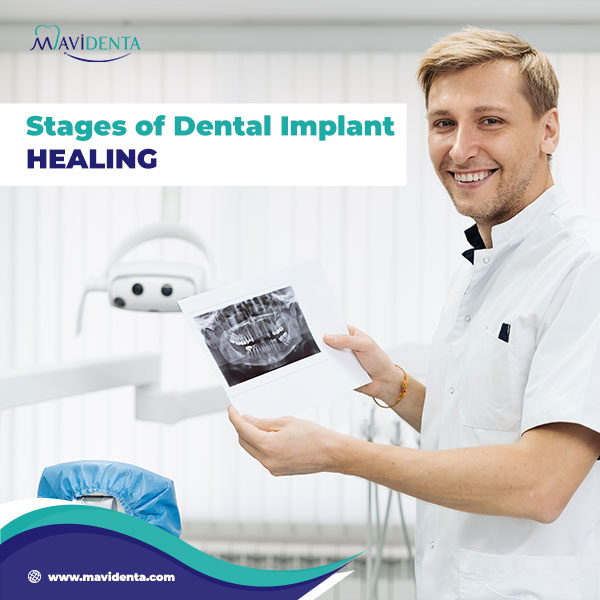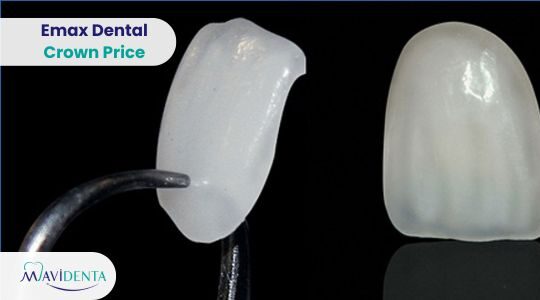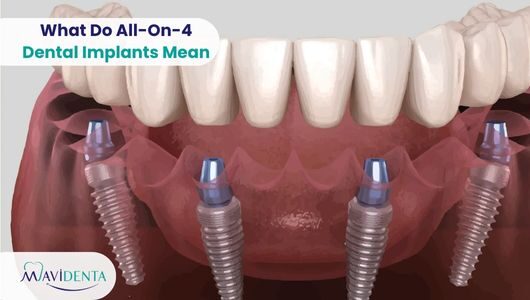Ever wondered about the Implant Tooth Healing Time? Dental implants have revolutionized dentistry, providing a reliable and long-lasting solution for replacing missing teeth. Patients and dental professionals must understand the healing process after implant placement. This article delves into the various stages of dental implant healing and factors influencing healing time and provides valuable insights into aftercare and potential complications. Let’s explore the journey of implant healing.
Dental Implant
A dental implant is an advanced solution for replacing missing teeth, offering a durable and natural-looking alternative to traditional dentures or bridges. It consists of three main components: the implant, abutment, and prosthetic crown.
The implant, which is frequently made of titanium, is surgically inserted into the jawbone to act as a reliable support for the replacement tooth. Over time, the implant fuses with the surrounding bone to provide exceptional stability and help in the implant tooth healing time in an osseointegration process.
The abutment, attached to the implant, connects it to the prosthetic crown, which is custom-designed to match the patient’s natural teeth in size, shape, and color. Indeed, a dental implant provides several advantages, including improved chewing ability, enhanced speech, and a boost in self-confidence. They also promote jawbone health by preventing bone loss.
It is worth noting that dental implants are a long-term investment in oral health and overall well-being with proper care and maintenance and can last for many years.
Stages of Dental Implant Healing

The process of implant tooth healing time occurs in several stages; each stage is essential for the success and stability of the implant:
Surgical Placement
The first stage involves the surgical placement of the dental implant into the jawbone. The implant is carefully placed in the intended area, typically performed under local anesthesia.
Osseointegration
Osseointegration is an essential stage in the dental implant, and in this procedure, the implant fuses with the surrounding bone tissue. This procedure usually takes several months as the bone grows and integrates with the implant, providing a solid foundation.
Abutment Placement
An abutment, a tiny connector, is attached to the implant after completing osseointegration. This component provides the connection point for the prosthetic tooth, which is visible above the gum line.
Impression and Prosthetic Design
An impression of the mouth is taken after the abutment has been installed. The creation of a custom-made prosthetic crown that perfectly matches the patient’s natural teeth is guided by this impression.
Prosthetic Attachment
The prosthetic crown is securely attached to the abutment in the final stage. This crown is carefully positioned for proper alignment, bite, and aesthetics, seamlessly integrating the surrounding teeth.
Post-operative care and routine checkups are essential during this time to track the success of the implant and the healing process. The implant’s and surrounding tissues’ longevity depends on maintaining good oral hygiene habits.
Read more: I Can Feel My Dental Implant Through My Gum
Factors Implant Tooth Healing Time
Several common factors affect the timeline for implant tooth healing. Understanding these factors can help you understand how long this procedure will take. Let us know the key factors influencing implant healing time.
1- Patient Health and Habits
The patient’s general health and lifestyle play an important role in determining the implant healing time. The body’s ability to regenerate bone tissue and integrate the implant can be significantly impacted by factors like smoking, chronic medical conditions, and weakened immune systems. On the contrary, patients with good health and positive habits can achieve faster and more successful healing outcomes.
If you seek a faster healing process, you should follow all the recommended post-operative instructions by your professional dentist for optimal implant healing.
2- Implant Location
The location of the implant in the mouth can affect the healing time. Implants placed in areas of dense, strong bone tend to heal faster compared to those in softer or compromised bone. The density and quality of the jaw can impact the osseointegration process.
3- Implant Type and Material
The type and material of the implant also can affect the healing time. Due to their biocompatibility, titanium implants generally have a high success rate and promote faster osseointegration. Furthermore, healing times may vary depending on the implant technologies used.
4- Surgical Technique
The precision of the surgical procedure is an important matter. Adequately performed surgery can reduce damage to the surrounding tissues, reduce the risk of complications, and accelerate the healing process. Highly skilled surgeons often use methods that enhance implant stability and promote faster implant tooth healing time.
5- Aftercare and Maintenance
Maintenance and post-operative care are essential for successful healing. Patients must adhere to dietary or exercise restrictions, practice oral hygiene as directed, and keep all scheduled follow-up appointments. This proactive approach helps to avoid any issues and guarantees a quick recovery.
It would help if you chose an excellent dental clinic and highly skilled dentists to guarantee a smooth healing process. We highly recommend Mavidenta Clinic, the High-quality Dental clinic in Istanbul. Start your radiant smile with Mavidenta!
Also check: Dental Centre Turkey Payment Plan
Average Healing Times
The duration of implant tooth healing time is a necessary matter for patients who need to perform a dental procedure. On average, the process includes several key stages. Initially, osseointegration, where the implant integrates with the jawbone, usually takes three to six months. This phase ensures a solid foundation for the prosthetic tooth.
After osseointegration, it takes a few weeks for the surrounding tissues to fully heal before placing an abutment and fastening the prosthetic crown. While these are average timeframes, it’s important to note that individual healing rates may vary depending on their general health and adherence to post-operative care.
Patients who are aware of the implant tooth healing timeline can set out on this journey with assurance and informed expectations.
Accelerating the Healing Process
As we know, the osseointegration process is vital for a successful outcome; however, it is a natural healing process for dental implants, but there are potential strategies that accelerate this stage, such as the following:
Optimal Nutrition
A balanced diet rich in essential nutrients such as calcium, vitamin D, and protein is necessary in order to promote bone health and help the implant integrate with the jawbone.
Avoiding Tobacco and Alcohol
Try to avoid smoking and drinking alcohol if you seek faster healing because tobacco and excessive alcohol consumption can hinder the healing response.
Regular Exercise
The increased blood flow caused by exercise can aid in faster implant tooth healing time. For advice on appropriate post-surgery exercise, you should consult your professional dentist.
Maintaining Oral Hygiene
Following the advised oral hygiene procedures reduces the possibility of complications and promotes a favorable environment for healing.
Compliance with Post-Operative Care
For optimal healing, you should adhere to the instructions provided by the dentist, including medication schedules and dietary guidelines.
Avoiding Excessive Pressure
Protecting the implant site from excessive pressure or force during the healing period is important to prevent any disruption to the integration process.
Supplemental Treatments
Some individuals may benefit from additional treatments like laser therapy or specific medications that can aid in the healing process. Consult with your dentist for personalized recommendations.
Regular Follow-Up Appointments
Regular checkups enable the dental professional to keep track of development and address any issues as soon as they arise.
Explore: Why are dental implants so cheap in Turkey?
Potential Complications and Delayed Healing

Despite the high success rate of dental implants, there are potential complications that may arise and lead to delayed healing during the implant tooth healing time. These may include:
– Infection: Bacterial infection at the surgical site can impede the healing process. To reduce this risk, it’s essential to practice excellent oral hygiene and adhere to post-operative care instructions.
– Poor Blood Supply: Healing can be slowed down by inadequate blood flow to the surgical site. Individuals with specific medical conditions or habits, such as smoking, may experience this more frequently.
– Insufficient Bone Density: In some cases, the jawbone may not have enough density to support the implant. This can lead to delayed osseointegration or implant failure.
– Implant Mobility: If the implant is subjected to excessive force or movement during the healing period, it can disrupt the integration process and lead to delayed healing.
– Nerve Damage: In a few rare instances, the implant placement may damage nearby nerves, causing numbness or tingling. This might make the recovery time longer.
– Autoimmune Disorders: Immune system disorders can impair the body’s capacity to heal effectively, potentially delaying the healing process.
– Medication Interactions: Blood thinners, for example, may interfere with the body’s ability to form blood clots, which may delay healing.
– Compromised Aftercare: Failure to follow post-operative care instructions, including proper oral hygiene practices and dietary restrictions, can contribute to delayed healing.
It is worth mentioning that while these complications are possible, they are relatively rare when implants are placed by experienced and qualified professionals. If any concerns arise during the implant tooth healing time, it’s crucial to promptly consult with a dentist for appropriate evaluation and intervention.
How long after dental implants can I eat normally?
After dental implant surgery, it’s crucial to allow for adequate healing time before returning to a regular diet. A soft or liquid diet is typically advised for the first few days to a week following the procedure.
As the Implant Tooth Healing Time progresses, typically over the course of several weeks, you can gradually reintroduce firmer and chewier foods. However, it’s essential to follow the specific dietary guidelines provided by your dental professional.
They will give you advice on when it is safe to start eating normally again, making sure that the implants have had enough time to stabilize and integrate with the jawbone before being put under pressure from routine chewing.
Also check: How Long After Dental Implants Can I Eat Normally?
How long does it take for the pain to go away after a tooth implant?
After a tooth implant procedure, it’s normal to experience some discomfort or mild pain. Usually, this becomes more obvious in the early postoperative days. However, pain can differ from person to person in terms of duration and intensity.
Acute discomfort usually subsides within the first 24 to 72 hours after the procedure. The initial discomfort can be managed with over-the-counter medications or painkillers that your dentist has prescribed.
You should feel a gradual improvement in pain and swelling over the coming days. Most patients feel significantly less pain by the end of the first week.
It’s crucial to adhere to your dentist’s postoperative care instructions, including any advice on managing pain. It’s critical to call your dentist right away if the pain persists, worsens, or is accompanied by severe swelling or other unsettling symptoms.
Also check: How To Heal Faster After Dental Implants?
How long do gums take to heal after implants?
The healing time for gums after implants, a crucial phase in the overall Implant Tooth Healing Time, varies from person to person.
The initial healing period lasts two to three weeks. Some swelling, minor discomfort, and potential bruising around the implant area are expected during this time.
You should notice these symptoms gradually fading as the days go on. However, complete gum healing might take several months. To encourage optimum healing, following the post-operative care guidelines given by your dental professional, including good oral hygiene habits and dietary restrictions, is crucial. Consult your dentist for personalized advice and reassurance if you have concerns about the healing process.
Conclusion
In conclusion, Implant Tooth Healing Time is a dynamic process marked by stages of osseointegration, abutment placement, and prosthetic attachment. But it differs according to every patient’s case. Therefore, you should adhere to post-operative care instructions to achieve a confident, radiant smile.
For any inquiries, feel free to Contact Our Clinic.
FAQs
How can I accelerate the healing process for dental implants?
Maintaining good nutrition, avoiding tobacco and alcohol, regular exercise, and adhering to post-operative care instructions can potentially accelerate the healing process.
When can I resume normal activities after dental implant surgery?
It is advisable to avoid strenuous activities for the first few days after surgery. Gradually, you can resume normal activities as recommended by your dentist.
Is pain normal after a tooth implant?
Yes, it is normal to experience some discomfort or mild pain after a tooth implant procedure. Pain relievers and following post-operative care instructions can help manage this.










